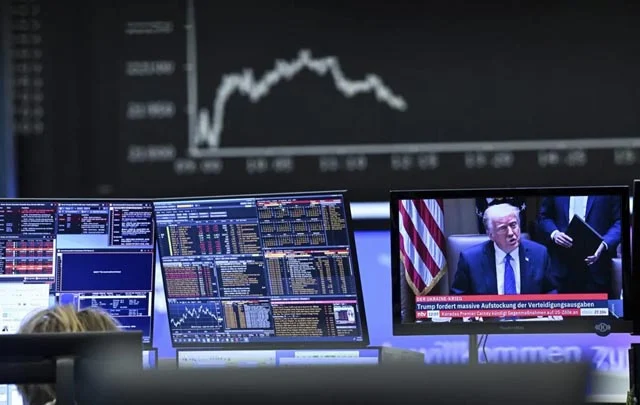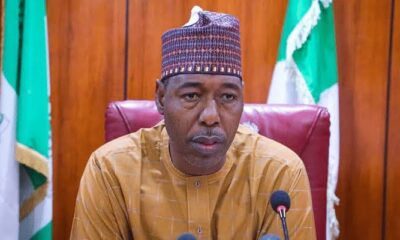Economy
Fuel prices may rise as crude nears $80/barrel

The prices of refined petroleum products may rise in the coming days following the increase in the cost of Brent, the global benchmark for crude.
Crude oil is a major commodity that determines the prices of refined petroleum products. On Sunday, the price of Brent reached $79.76 per barrel.
The rise in the cost of the commodity from the $72.88 recorded in December 2024 that fuel prices across Nigerian depots may be impacted.
The increase in Brent price is attributed to geopolitical tensions, particularly sanctions imposed on Russian oil exports. Supply concerns and seasonal demand fluctuations in colder regions have also contributed to the upward trend.
Sources informed our correspondent that several fuel depots began reporting price increases for diesel on Friday, marking the start of a noticeable rise in fuel costs across various regions.
Analysts also suggested that the Brent crude price surge is a major driver, as many Nigerian depot owners rely on imports to meet diesel demand.
The correlation between crude oil prices and refined products is well-established, as Brent serves as a benchmark for global petroleum product pricing.
With the increase in crude oil costs, importers are likely to adjust their prices to cover higher procurement and shipping costs.
Recall that the Federal Government’s oil price benchmark in the 2025 budget estimates is $75 per barrel.
Price data obtained by our correspondent analysing diesel price movements at the loading depot showed that the Nipco depot in Lagos saw an increase of N70 from N1,050 to N1,120 per litre on Friday.
Prudent depot recorded an increase, closing the week at N1,045, compared to an earlier N1,025 per litre.
Commenting on the development, an oil and gas expert, Olatide Jeremiah, said depots are poised to increase the loading price of refined petroleum products on Monday.
Jeremiah, who is the Chief Executive Officer of petroleumprice.ng, said, “It implies that there is a possibility of increased fuel prices, particularly diesel prices.
“As of Friday, when Brent crude neared $80, prices selectively increased in some depots in Lagos, and on Monday, prices might be jacked up by importers because a large chunk of oil marketers import petroleum products and Brent crude is a major determining factor in the refining process.”
Economy
SEE Current Black Market Dollar (USD) To Naira (NGN) Exchange Rate

The exchange rate between the US dollar and the Nigerian naira continues to draw significant attention from individuals and businesses alike, especially those involved in international trade and remittances.
On Saturday, April 12, 2025, activity in the Lagos parallel market, commonly known as the black market shows that the buying rate for one US dollar stands at ₦1570, while the selling rate is ₦1575.
These figures are sourced from traders and Bureau De Change (BDC) operators who are active in key currency exchange hubs across Lagos.
Why the Black Market Rate Matters
Although the Central Bank of Nigeria (CBN) does not officially recognize or support the use of the black market for foreign exchange transactions, many Nigerians still rely on it due to difficulties in accessing forex through official banking channels. Issues such as limited availability, long processing times, and strict documentation requirements have made the black market a more accessible, albeit riskier, alternative.
CBN’s Official Position
The CBN continues to warn against participating in parallel market trading, stating that such activities undermine the stability of the national currency. The apex bank urges those in need of foreign currency to apply through authorized financial institutions, which are mandated to follow official exchange rates.
Nonetheless, the disparity between the official and unofficial markets persists, often influenced by market forces such as demand, inflation, and fluctuations in Nigeria’s foreign reserves.
Latest Exchange Rates Overview
Black Market (Parallel Market) Rate
Currency Pair Buying Rate Selling Rate
USD/NGN ₦1570 ₦1575
CBN Official Rate
Currency Pair Highest Rate Lowest Rate
USD/NGN ₦1630 ₦1570
Key Notes for Forex Users
The exchange rates in the black market often differ slightly from one location or dealer to another due to market volatility and negotiation margins.
Rates can also fluctuate within hours based on economic news, government policies, and global financial trends.
It is advisable to compare rates from multiple sources before conducting any large transactions, especially in volatile markets.
What This Means for Nigerians
The current forex rates reflect continued pressure on the naira, and many analysts believe that inflation, reduced oil revenue, and inconsistent monetary policies are key factors driving the demand for the dollar. For everyday Nigerians, this means the cost of imported goods remains high, and businesses dependent on international suppliers face growing challenges.
Until forex supply stabilizes through official channels, the black market will likely remain a major player in Nigeria’s currency landscape.
Economy
CHECK Exchange Rate As Naira Weakens More In Parallel Market

Naira has continued its downward slide in the parallel market on Thursday, exchanging at N1,621/$1, a depreciation from N1,580/$1 recorded just a day earlier on Wednesday.
This represents a N41 decline in 24 hours, deepening concerns among traders and economic watchers about sustained volatility in the FX market.
While the official exchange rate stood at N1,644.00/$1 on Wednesday, according to figures published on the Central Bank of Nigeria (CBN) website, there was no updated official rate published by the CBN several hours after the market close on Thursday.
Meanwhile, market participants at Wuse Zone 4 in Abuja attributed the persistent depreciation to a resurgence in speculative activities, unmet demand from importers, and lingering confidence issues in the foreign exchange market.
Alhaji Aminu Gwadabe, President of the Association of Bureau De Change Operators of Nigeria (ABCON), attributed the ongoing volatility in the forex market to a mix of local and global uncertainties. In a message sent to Nairametrics, he stated:
“The volatility, fears, happenings, and shocks in both the local and international markets called for disdain.
President Trump’s tariff announcements have sent markets into panic, loss of confidence, revenue losses, and budget reviews.”
He added that despite ongoing interventions by the CBN, instability persists.
“As usual, the CBN, being a catalytic actor, must continue to ensure stability through timely interventions. However, volatility remains a challenge and needs to be more comprehensively addressed,” Gwadabe said.
He further called for an expanded policy transmission mechanism to better serve the retail end of the FX market.
“It is therefore necessary for the CBN to reevaluate the efficacy of that Policy transmission mechanisms and expand its scope to the BDCs retail segment of the market to cater for the needs of the critical retail needs of invisible transactions where the BDCs pose the most potent tool of the CBN policy transmission mechanism.”
Dr. Muda Yusuf, CEO of the Centre for the Promotion of Private Enterprise (CPPE), also linked the naira’s recent struggles to global developments and speculative pressures.
“This is not unconnected to recent policy signals from President Trump and global oil price movements. The market is heavily information-driven, and speculative pressure has spiked following the tariff announcements,” Yusuf explained.
“Now that Trump appears to be having second thoughts, we might even see a bit of a breather in the FX market,” he added.
Meanwhile, traders on the ground say the situation is being worsened by the uncertainty surrounding ongoing government reforms and inconsistent access to official FX windows.
“The demand today was unusually high, especially from small businesses that can’t access the banks. It’s putting pressure on our supply,” a trader at Abuja’s Wuse Zone 4, who asked not to be named stated.
The spread between the official exchange rate of N1,644/$1 and the parallel market rate of N1,621/$1 narrowed slightly on Thursday, a sign that some convergence may be taking place, despite persistent volatility.
Market analysts warn that unless the CBN resumes consistent interventions or significantly boosts FX liquidity, the naira may continue to face downward pressure in the weeks ahead
The continued slide of the naira, despite heightened CBN interventions, signals persistent challenges in Nigeria’s FX liquidity and structural demand-supply mismatch.
Economy
Asian stocks jump as Trump postpones painful tariffs

Stocks rocketed Thursday as a relief rally spread through markets after Donald Trump paused crippling tariffs on US partners, with Chinese markets even brushing off his decision to ramp up duties on Beijing to 125 percent.
The across-the-board gains tracked a blistering performance on Wall Street as the US president said he would delay for 90 days measures announced last week that set off a firestorm on trading floors and sparked global recession fears.
Trump said he would keep in place a basic levy of 10 percent on dozens of countries but upped the ante in his brutal trade war with superpower rival China by hitting it even harder after it retaliated.
China’s own 84 percent retaliatory measures kicked in at 0401 GMT Thursday, later saying that US tariffs would “severely impact the stability of the global economic order”.
Trump made the decision because he said investors were “jumping a little bit out of line” as markets collapsed and US Treasuries — considered the safest option in times of crisis — were also showing signs of cracking on concerns about the world’s top economy.
People “were getting yippy, a little bit afraid”, he added, referring to a term in sports to describe a loss of nerves.
The extra tariffs on Beijing, however, were “based on the lack of respect that China has shown to the world’s markets”, Trump said.
The president denied he had made a U-turn, telling reporters that “you have to be flexible”.
And his top trade advisor, Peter Navarro, said, “This will go down in American history as the greatest trade negotiating day we have ever had.
“We’re in a beautiful position for the next 90 days, we’ve got over 75 countries that are going to come in and negotiate with us and what they’re going to have to do, without fail, is they’re going to have to lower their non-tariff barriers.”
Trump’s shock announcement on his Truth Social network sparked a buying frenzy as Asian and European investors chased beaten-down stocks.
“Asia markets are flipping the switch — from fear to euphoria — as Trump throws a 90-day lifeline, pausing the reciprocal tariff barrage,” said Stephen Innes at SPI Asset Management.
“The president’s post nodded to the ‘yippy’ reaction to his historic hikes, and honestly, that sums it up.
“We just witnessed one of the all-time bouncebacks — and now, we look for Asia investors, much like their North American counterparts, to step in and buy the ‘yips’.”
Hong Kong rallied more than two percent — a third day of gains after collapsing more than 13 percent on Monday in its worst day since 1997 during the Asian financial crisis. Shanghai gained more than one percent.
The two markets have been given extra support by optimism that China will unveil fresh stimulus to support its economy in light of the tariff measures. Official data showing another drop in consumer prices last month added to those hopes.
– ‘Fear to euphoria’ –
Tokyo’s Nikkei surged more than nine percent, while Taipei’s 9.3 percent gain was its best rise on record — after Monday’s 9.7 percent drop represented its worst fall.
Seoul, Singapore, Jakarta, Sydney, Saigon and Bangkok climbed between four and 6.6 percent. Manila and Wellington were also well in the positive territory.
London, Paris and Frankfurt soared at the open.
Tech firms were the standout performers, with Sony, Sharp, Panasonic and SoftBank chalking up double-digit gains, while airlines, car makers and casinos also enjoyed strong buying.
Apple suppliers posted strong rallies — Hong Kong-listed AAC Technologies surged 5.6 percent and in Taiwan, Hon Hai added almost 10 percent.
Gold surged almost three percent to around $3,120 — around $50 short of its record touched last month — thanks to the weaker dollar and as the uncertainty saw investors rush into the safe haven.
Chihiro Ota, at SMBC Nikko Securities, said: “What happens now? If the US takes a hardline stance (in negotiations), then the market would be disappointed. If it turns out that they can engage in talks, then it may create a room for (an upswing).”
US Treasury yields also edged down after a successful auction of $38 billion in notes, said Briefing.com.
That eased pressure on the bond market, which had fanned worries that investors were losing confidence in the United States.
However, observers warn that the China-US standoff could be another step towards a disengagement from the world’s top two economies.
“The escalation of the trade war between the US and China suggests that a full trade decoupling is increasingly likely,” said Mali Chivakul, emerging markets economist at J. Safra Sarasin bank.
“Even if we may see a de-escalation later, a decoupling could still be the result.”
Trump’s trade war is also causing a headache for the US Federal Reserve as it weighs whether to cut interest rates to protect the economy, or keep them elevated to ward off the inflation many say tariffs will fuel.
Minutes from its March meeting, released Wednesday, showed members felt they “may face difficult tradeoffs if inflation proved to be more persistent while the outlook for growth and employment weakened”.
Oil prices edged down after bouncing more than four percent Wednesday, though they remain under pressure amid concerns about the global economy and its impact on demand.
– Key figures around 0715 GMT –
Tokyo – Nikkei 225: 9.1 percent at 34,609.00 (close)
Hong Kong – Hang Seng Index: UP 2.7 percent at 20,804.08
Shanghai – Composite: UP 1.2 percent at 3,223.64 (close)
London – FTSE 100: UP 6.1 percent at 8,145.26
Dollar/yen: DOWN at 147.05 yen from 147.82 yen on Wednesday
Euro/dollar: UP at $1.0968 from $1.0948
Pound/dollar: UP at $1.2875 from $1.2810
Euro/pound: DOWN at 85.20 pence from 85.45 pence
West Texas Intermediate: DOWN 0.6 percent at $62.00 per barrel
Brent North Sea Crude: DOWN 0.7 percent at $65.04 per barrel
New York – Dow: UP 7.9 percent at 40,608.45 (close)
AFP
-

 News20 hours ago
News20 hours agoTinubu’s ugly past shores up as US Judge orders DEA, FBI to release files
-

 News8 hours ago
News8 hours agoAutonomy: 774 LGs challenge FG, states in court Tuesday
-

 Sports18 hours ago
Sports18 hours agoJust in: Newcastle pummel Man United 4-1
-

 News18 hours ago
News18 hours ago2027: Atiku’s Opposition Front is a mission impossible-Wike declares
-

 Economy24 hours ago
Economy24 hours agoSEE Current Black Market Dollar (USD) To Naira (NGN) Exchange Rate
-

 News20 hours ago
News20 hours agoSAD! Another Christian Chukwu’s team mate, Charles Bassey is dead
-

 News8 hours ago
News8 hours agoZulum orders arrest, offers house, scholarship to abused boy in viral video
-

 News24 hours ago
News24 hours agoJapa : Illegal Immigrants Can Now Stay Based On Boss Recommendations in US

















